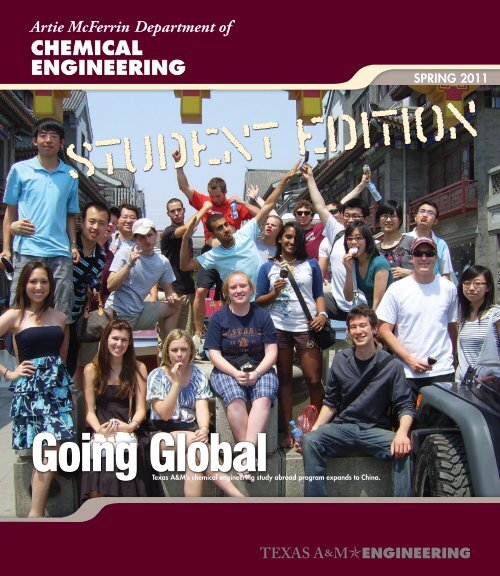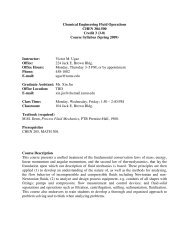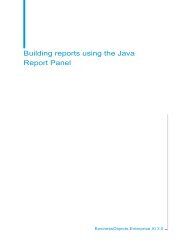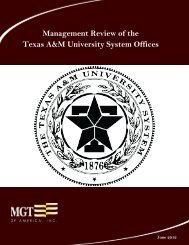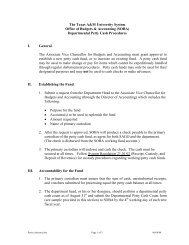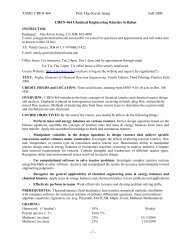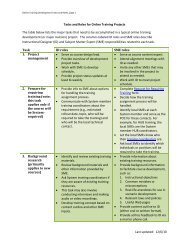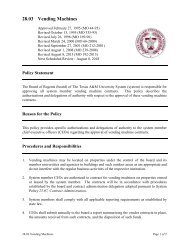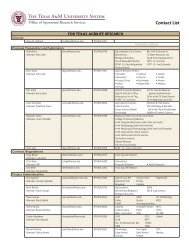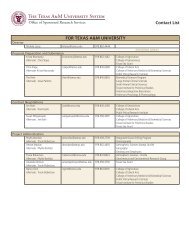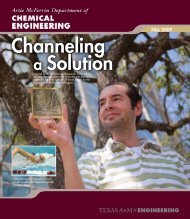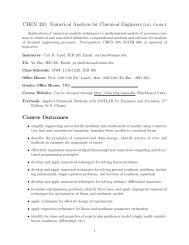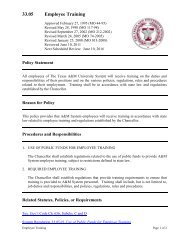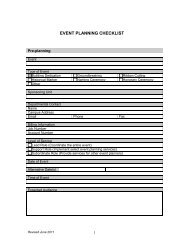Spring 2011 - Department of Chemical Engineering - Texas A&M ...
Spring 2011 - Department of Chemical Engineering - Texas A&M ...
Spring 2011 - Department of Chemical Engineering - Texas A&M ...
You also want an ePaper? Increase the reach of your titles
YUMPU automatically turns print PDFs into web optimized ePapers that Google loves.
SPRING <strong>2011</strong><br />
STUDENT EDITION<br />
Going Global<br />
<strong>Texas</strong> A&M’s chemical engineering study abroad program expands to China.
Michael V. Pishko<br />
<strong>Department</strong> Head and<br />
Charles D. Holland ‘53 Pr<strong>of</strong>essor<br />
Note from the <strong>Department</strong> Head<br />
Of the many achievements that continue to take place within the walls <strong>of</strong> this<br />
department, the cultivation <strong>of</strong> a rigorous but rewarding educational experience for<br />
our students is one accomplishment <strong>of</strong> which our faculty remains particularly proud.<br />
It’s this unique academic environment – one that melds intense learning with<br />
personal growth opportunities for our undergraduates – that defines chemical<br />
engineering education at <strong>Texas</strong> A&M University.<br />
Fostering such an experience requires devoted faculty members, and this<br />
department is fortunate to have such individuals. Not only are they outstanding<br />
researchers within their respective fields, they are outstanding teachers – teachers<br />
who leverage their extraordinary knowledge and abilities to educate the next<br />
generation <strong>of</strong> chemical engineers.<br />
Of course, it also helps to have incredibly talented and ambitious students<br />
who are eager to learn, and we’ve got those too. Whether they are participating in<br />
study abroad programs, conducting community service projects or assisting with<br />
research, the students within this department consistently accept new challenges<br />
and rise to meet the l<strong>of</strong>ty educational standards set for them. What’s more, they<br />
don’t stop once they graduate; they go on to become significant leaders in the<br />
chemical engineering field.<br />
With those things in mind, we’ve decided to take a more active role in<br />
highlighting some <strong>of</strong> our student-related endeavors. Beginning with this issue, our<br />
department will devote each spring edition <strong>of</strong> its magazine to our students and our<br />
student-related activities. I believe this new format serves as a nice complement to<br />
our research-intensive fall edition by shining the spotlight on some well-deserving<br />
individuals and programs. I hope you enjoy our stories.<br />
2<br />
6<br />
2<br />
5<br />
6<br />
10<br />
14<br />
CONTENTS<br />
Summer <strong>of</strong> Science<br />
Through the department’s “Research<br />
Experience for Undergraduates” program,<br />
students are learning the ins and outs <strong>of</strong><br />
research and deciding if graduate school<br />
is the right move for them.<br />
Prospecting in Aggieland<br />
A university-wide open house gives<br />
prospective college students the opportunity<br />
to learn about chemical engineering and<br />
its impact on the world.<br />
East <strong>of</strong> Aggieland<br />
The department’s study abroad program in<br />
China challenges students academically while<br />
bolstering their cultural awareness.<br />
Around the <strong>Department</strong><br />
<strong>Chemical</strong> engineering students and faculty<br />
members excel.<br />
Former Student Spotlight<br />
Charlie Shaver, a 1980 chemical engineering<br />
graduate and CEO/ president <strong>of</strong> TPC Group,<br />
Inc., knows that the people in his company are<br />
as valuable as the products they produce.<br />
<strong>Department</strong> at a Glance<br />
Total Faculty 32<br />
Pr<strong>of</strong>essors 14<br />
Associate Pr<strong>of</strong>essors 5<br />
Assistant Pr<strong>of</strong>essors 8<br />
Non-tenured/ Non-tenure Track 5<br />
Endowed Chair Holders 3<br />
Endowed Pr<strong>of</strong>essorship Holders 10<br />
U.S. News & World Report Rankings<br />
Rankings Among Public Institutions<br />
11th Undergraduate<br />
17th Graduate<br />
Research Areas<br />
Biomedical and Biomolecular<br />
Complex Fluids<br />
Computational <strong>Chemical</strong> <strong>Engineering</strong><br />
Environmental<br />
Materials<br />
Microelectronics<br />
Micr<strong>of</strong>luidics<br />
Modeling and Simulation<br />
Nanotechnology<br />
Process Safety<br />
Process Systems <strong>Engineering</strong><br />
Reaction <strong>Engineering</strong><br />
Thermodynamics<br />
Thoughts on a story or suggestions for a future issue?<br />
Please direct all comments to Ryan A. Garcia, communications coordinator for the<br />
Artie McFerrin <strong>Department</strong> <strong>of</strong> <strong>Chemical</strong> <strong>Engineering</strong> at <strong>Texas</strong> A&M University.<br />
PHONE: 979.845.9237<br />
EMAIL: ryan.garcia99@tamu.edu<br />
MAIL: Artie McFerrin <strong>Department</strong> <strong>of</strong> <strong>Chemical</strong> <strong>Engineering</strong><br />
<strong>Texas</strong> A&M University<br />
3122 TAMU<br />
College Station, TX 77843-3122<br />
THE ARTIE MCFERRIN DEPARTMENT OF<br />
CHEMICAL ENGINEERING MAGAZINE, Issue 6,<br />
<strong>Spring</strong> Edition, April <strong>2011</strong><br />
17<br />
Friends <strong>of</strong> <strong>Chemical</strong> <strong>Engineering</strong> at<br />
<strong>Texas</strong> A&M<br />
Support <strong>of</strong> the Artie McFerrin <strong>Department</strong> <strong>of</strong><br />
<strong>Chemical</strong> <strong>Engineering</strong> throughout the last year<br />
Page 1
The Artie McFerrin <strong>Department</strong> <strong>of</strong> <strong>Chemical</strong> <strong>Engineering</strong><br />
Research Experience for Undergraduates (REU) program is<br />
exposing students to a world-class research environment, enabling<br />
them to advance important research findings, and helping them<br />
to determine if graduate school is right for them.<br />
Without having first experienced the research environment<br />
within <strong>Texas</strong> A&M University’s Artie McFerrin <strong>Department</strong> <strong>of</strong><br />
<strong>Chemical</strong> <strong>Engineering</strong>, Matthew Rehmann likely would not<br />
be pursuing a chemical<br />
engineering doctorate<br />
through which he aims<br />
to learn more about the<br />
interface between bone<br />
and ligament in knee<br />
reconstructions.<br />
“I didn’t want to do a<br />
Ph.D. program until I had<br />
gone through the <strong>Texas</strong> A&M undergraduate research program; I<br />
can honestly say that just the experience and how much I enjoyed<br />
it is what made me want to go to a Ph.D. program afterwards,”<br />
says Rehmann, who participated in the department’s Research<br />
Experience for Undergraduates (REU) program as a visiting<br />
undergraduate from the University <strong>of</strong> Pennsylvania.<br />
Rehmann, a New Jersey native, is now a first-year student in<br />
the chemical engineering graduate program at the University <strong>of</strong><br />
Delaware, but it’s his time at <strong>Texas</strong> A&M, under the tutelage <strong>of</strong><br />
Assistant Pr<strong>of</strong>essor Katy Kao, that he says opened his mind to the<br />
possibilities <strong>of</strong> furthering his education.<br />
“It was excellent. I can honestly say that I have never had that<br />
kind <strong>of</strong> experience – before <strong>Texas</strong> A&M,” Rehmann says. “To the<br />
extent that you can as an undergraduate in a 10-week period, I<br />
really felt as if I was commanding my own project.”<br />
“I didn’t want to do a Ph.D. program until I had gone<br />
through the <strong>Texas</strong> A&M undergraduate research<br />
program; I can honestly say that just the experience<br />
and how much I enjoyed it is what made me want to<br />
go to a Ph.D. program afterwards.”<br />
Sponsored by the National Science Foundation, the<br />
department’s REU program <strong>of</strong>fers undergraduate students<br />
from other universities the opportunity to participate in<br />
ongoing research with faculty members during a 10-week<br />
period in the summer.<br />
Through the program, students gain valuable hands-on<br />
experience while learning about research under way at <strong>Texas</strong><br />
A&M and how it is benefitting society. They also learn more about<br />
research-related careers and how to create effective graduate school<br />
applications.<br />
To participate in the<br />
program, a student must have at<br />
least a 3.3 grade point average<br />
and have rising junior or senior<br />
status with at least 60 semester<br />
hours (or equivalent quarter<br />
hours) completed toward his<br />
or her degree. In addition,<br />
a student must be a U.S. citizen or permanent resident who is<br />
majoring in chemical engineering or a related discipline such as<br />
biology, chemistry, math, physics or another engineering field.<br />
Each participant is awarded a stipend <strong>of</strong> $5,000 for<br />
participation in the 10-week program. Other benefits include<br />
housing, meal and travel allowances; 1.0 credit hour <strong>of</strong><br />
undergraduate course credit; and full access to university<br />
recreational facilities.<br />
“The REU grant is essentially a teaching grant; it’s not really a<br />
research grant – it does have a research component but it’s really<br />
a training grant for undergraduate students,” explains Associate<br />
Pr<strong>of</strong>essor Juergen Hahn, who is the co-principle investigator for<br />
the REU program along with Associate Pr<strong>of</strong>essor Daniel Shantz.<br />
A previous successful REU program in the department was<br />
coordinated by Pr<strong>of</strong>essor Perla Balbuena.<br />
REU Student Matthew Rehmann<br />
“We genuinely want to look at students who do not have prior<br />
research experience because the point <strong>of</strong> this program is to expose<br />
them to research,” Hahn adds. “It’s not about getting the best<br />
researchers for the faculty. We want to teach these students things<br />
such as research methodologies; self-discipline because this is a<br />
little longer than just the next homework set; teamwork and team<br />
integration; and how to appropriately and effectively report results.”<br />
Once students are accepted into the program, they are<br />
assigned to a faculty member. This faculty member conceives the<br />
research project and oversees the participating student during<br />
his or her time at <strong>Texas</strong> A&M. Of course, that means a successful<br />
REU program hinges on having faculty members who are willing<br />
to take time out <strong>of</strong> their demanding teaching and research<br />
schedules to train relatively inexperienced students. For the Artie<br />
McFerrin <strong>Department</strong> <strong>of</strong> <strong>Chemical</strong> <strong>Engineering</strong>, producing such<br />
faculty volunteers is not an issue, Hahn says.<br />
“The people here care; they really do,” Hahn says. “Most <strong>of</strong><br />
my colleagues from other schools who I have talked to about<br />
this program have trouble finding the minimum number <strong>of</strong><br />
faculty volunteers. In our case, we actually had more than<br />
enough. That’s a good sign.”<br />
In addition to conducting research in the laboratory, students<br />
make short progress presentations to their peers during program<br />
meetings, attend presentation skills workshops, make formal<br />
poster presentations <strong>of</strong> their research experiences at the end<br />
<strong>of</strong> the program, and submit written final reports describing<br />
Page 2 Page 3
the results <strong>of</strong> their research. At the conclusion <strong>of</strong> the program,<br />
students present their results at a series <strong>of</strong> sessions.<br />
Some students even go on to present their results at national<br />
and international conferences as well as publish them in<br />
scientific journals. That was the case for Rehmann, whose work<br />
on engineering butanol-resistant E. coli was published in the<br />
scientific journal “Biotechnology Letters,” along with Kao’s<br />
graduate student James Winkler.<br />
“Matt laid the foundations for an on-going project in my lab on<br />
generating novel organisms with industrially relevant properties,<br />
and he was able to produce publishable results, which is very<br />
rare for an undergraduate student working alone for less than 10<br />
weeks,” Kao notes.<br />
In another instance,<br />
Balbuena recalls<br />
running into one<br />
<strong>of</strong> her former REU<br />
students at a national<br />
meeting <strong>of</strong> the report results.”<br />
American Institute <strong>of</strong><br />
<strong>Chemical</strong> Engineers.<br />
The student, she said, had since received his doctorate from<br />
the University <strong>of</strong> Minnesota and is now an executive in a<br />
major food company.<br />
“I introduced him into the world <strong>of</strong> molecular modeling, and<br />
we published a paper together on the interactions <strong>of</strong> water with<br />
a polymer used in fuel cells,” Balbuena said. “He was fascinated,<br />
and his enthusiasm engaged other group members. For him, his<br />
REU work was decisive in choosing graduate school.”<br />
Key to the experience, Hahn notes, is the fact that the students<br />
have the opportunity to play an important role in advancing<br />
research as opposed to simply being assigned “grunt” work.<br />
That’s a point <strong>of</strong> emphasis with Balbuena, who understands the<br />
importance <strong>of</strong> exposing undergraduates to research in a way that<br />
allows them to grow.<br />
“It’s not useful to the student if the student’s task is to<br />
exclusively collect data in a routine way,” Balbuena says.<br />
“However, it could be very helpful if the student in part collects<br />
data points and in part analyzes the data, while he or she is<br />
inserted and interacts with the research group, which includes the<br />
faculty adviser, graduate students, other undergraduate students<br />
and post-doctoral associates. This allows the undergraduate to<br />
more effectively visualize and add ideas to the whole picture,<br />
impacting the research group as a whole.”<br />
With the intent <strong>of</strong> equipping these students with a broader,<br />
diverse perspective, the REU program fosters interactions<br />
between its participants and other chemical engineering student<br />
researchers from <strong>Texas</strong> A&M and abroad.<br />
Running parallel to the REU program, the Undergraduate<br />
Summer Research Grants (USRG) program enables select <strong>Texas</strong><br />
A&M students to participate in a research experience. In addition,<br />
summer exchange programs with Tsinghua University in China,<br />
Universidad Industrial<br />
de Santander, and<br />
Universidad de los Andes<br />
in Colombia provide<br />
foreign undergraduates<br />
with parallel research<br />
opportunities.<br />
The result, Hahn notes,<br />
is a diverse mixture <strong>of</strong><br />
nearly 20 undergraduate students from various backgrounds, all<br />
converging on <strong>Texas</strong> A&M with the purpose <strong>of</strong> learning about<br />
research. In the process, they also learn about each other while<br />
discovering together what makes <strong>Texas</strong> A&M the special place<br />
that it is.<br />
Above all, they get to experience a world-class research<br />
environment and determine if a graduate education is right for them.<br />
“What I really want them to take away from this program<br />
is a much better idea <strong>of</strong> what research is really about, and that<br />
includes both the preparation needed in order to do it and how<br />
to actually conduct the research as well as how to convey findings<br />
to others afterwards,” Hahn says.<br />
“If somebody wants to come back to attend graduate school<br />
afterwards because <strong>of</strong> this experience, then that is even better,<br />
but I’m happy if they just gain a better understanding <strong>of</strong> what<br />
research and graduate school is about and can then decide if that<br />
is something that they want to pursue. Hopefully they will take<br />
away an experience that they simply could not get where they<br />
currently are at.”<br />
“We want to teach these students things such as research<br />
methodologies; self-discipline because this is a little<br />
longer than just the next homework set; teamwork and<br />
team integration; and how to appropriately and effectively<br />
Associate Pr<strong>of</strong>essor Juergen Hahn<br />
For more information on the Artie McFerrin <strong>Department</strong> <strong>of</strong> <strong>Chemical</strong> <strong>Engineering</strong> Research Experience for Undergraduates program,<br />
visit www.che.tamu.edu and click on “REU,” or contact Juergen Hahn, associate pr<strong>of</strong>essor and REU coordinator, via email: hahn@tamu.edu<br />
PROSPEC ING IN AGGIELAND<br />
Thanks to Pr<strong>of</strong>essor Mark Holtzapple and a <strong>Texas</strong> A&M<br />
open-house event known as “Aggieland Saturday,” prospective<br />
students got a glimpse into the impact chemical engineering<br />
can make on issues <strong>of</strong> global importance.<br />
For the prospective chemical engineering students touring the<br />
campus this past February as part <strong>of</strong> an annual open-house event,<br />
the message from Pr<strong>of</strong>essor Mark Holtzapple was clear:<br />
Some <strong>of</strong> the most critical issues facing the world’s everburgeoning<br />
population are being addressed by chemical<br />
engineers – across the globe and at <strong>Texas</strong> A&M University.<br />
From energy and environmental issues to overcoming disease<br />
and thwarting terrorism,<br />
chemical engineers play a<br />
larger role than ever, said<br />
Holtzapple, addressing<br />
the group, which largely<br />
consisted <strong>of</strong> high school<br />
students and their parents<br />
as well as transfer students.<br />
The group converged<br />
on campus for “Aggieland<br />
Saturday,” a universitywide<br />
open house created<br />
to help prospective<br />
students and their families<br />
learn about the opportunities<br />
available at <strong>Texas</strong> A&M. Dr. Mark Holtzapple<br />
Through the program, the<br />
university opened its doors to an estimated 10,000 prospective<br />
students, including those with aims at pursuing a chemical<br />
engineering education.<br />
While on campus, participants met current students, toured<br />
residence halls and visited libraries and computer labs – all in an<br />
attempt to gain a better understanding about what <strong>Texas</strong> A&M<br />
has to <strong>of</strong>fer. They also had the opportunity to learn more about<br />
<strong>Texas</strong> A&M’s academic colleges and the majors they <strong>of</strong>fer. In<br />
addition, a variety <strong>of</strong> group sessions provided information about<br />
admissions, financial aid, student services, student organizations,<br />
and student traditions.<br />
Sponsored by The Association <strong>of</strong> Former Students, the event,<br />
which was free to attend, featured interactive demonstrations,<br />
campus tours, and several other activities that enabled<br />
participants to focus on their particular areas <strong>of</strong> interest.<br />
Those students with chemical engineering interests visited the Jack<br />
E. Brown <strong>Engineering</strong> Building – home <strong>of</strong> chemical engineering at<br />
<strong>Texas</strong> A&M – and soon found themselves immersed in a discussion<br />
about the world’s energy supplies with Holtzapple, pr<strong>of</strong>essor in the<br />
Artie McFerrin <strong>Department</strong> <strong>of</strong> <strong>Chemical</strong> <strong>Engineering</strong>.<br />
And for those students, there may not have been a more<br />
appropriate person with whom to have that discussion. Few people<br />
are as well-versed on energy issues as Holtzapple, who has devoted<br />
more than 30 years <strong>of</strong> his career to issues <strong>of</strong> energy sustainability.<br />
Through his research, he’s now on the cusp <strong>of</strong> <strong>of</strong>fering a<br />
solution to one <strong>of</strong> society’s biggest energy-related issues – helping<br />
to alleviate the nation’s dependence on foreign oil by developing a<br />
process that, quite simply,<br />
turns trash into gas.<br />
More specifically,<br />
the process produces<br />
renewable gasoline from<br />
biomass — any feedstock<br />
including, trees, grass,<br />
manure, sewage sludge,<br />
garbage, agricultural<br />
residues, and energy crops.<br />
Detailing that process,<br />
Holtzapple impressed<br />
upon the group the need<br />
for innovative ideas<br />
grounded in an understanding <strong>of</strong> the geopolitical framework<br />
that is shaping their lives.<br />
For instance, Holtzapple noted, the United States spends an<br />
astonishing $400 billion a year importing foreign oil. It doesn’t<br />
have to be that way, he said, using his own work as an illustration<br />
<strong>of</strong> how chemical engineering can make a positive impact.<br />
Further illustrating that point, Holtzapple also reviewed his<br />
work with the city <strong>of</strong> Laredo, <strong>Texas</strong> – work that has resulted in a<br />
fully functioning desalination pilot plant. Utilizing Holtzapple’s<br />
method to more efficiently desalinate water, the new pilot plant<br />
will provide data to help design next-generation desalination<br />
plants that can potentially help the city <strong>of</strong> Laredo, which is<br />
near the limit <strong>of</strong> water it can draw from the Rio Grande River to<br />
support its 200,000 citizens.<br />
Overall, it was an excursion into the realm <strong>of</strong> chemical<br />
engineering that was as much about impact as it was innovation,<br />
as much about solutions as it was science – not a bad starting<br />
point for many <strong>of</strong> these potential chemical engineers.<br />
Page 4 Page 5
Originally Peiyang University, Tianjin University was established<br />
in 1895 as the first educational institution <strong>of</strong> higher learning<br />
in China. Only 30 minutes from Beijing, the university is<br />
located in Tianjin, China’s sixth-largest municipality, boasting a<br />
population <strong>of</strong> more than 11 million. The municipality itself is<br />
an important industrial base, featuring a variety <strong>of</strong> major<br />
industries including petrochemical, textiles, automotive,<br />
mechanical and metalworking.<br />
The expanding multinational nature <strong>of</strong> the chemical<br />
industry is exactly why Senior Lecturer John Baldwin believes<br />
the Tianjin study abroad program is critical in the development<br />
<strong>of</strong> well-rounded engineers. Baldwin, who taught a senior-level<br />
plant design course last year as part <strong>of</strong> the program, says the<br />
international exposure <strong>of</strong>fered by the course is simulating an<br />
experience many <strong>of</strong> his soon-to-be graduates will likely encounter.<br />
“The days <strong>of</strong> a design project being completed all in one<br />
The Artie McFerrin <strong>Department</strong> <strong>of</strong> <strong>Chemical</strong> <strong>Engineering</strong> study<br />
abroad program heads East for a cultural experience in China that is<br />
both demanding and rewarding for its student engineers.<br />
Participating in their department’s study abroad program in<br />
China, students in the Artie McFerrin <strong>Department</strong> <strong>of</strong> <strong>Chemical</strong><br />
<strong>Engineering</strong> expected to<br />
find themselves immersed<br />
in a foreign culture, rich<br />
in tradition and rapidly<br />
growing in economic<br />
significance to the world<br />
around it. What they<br />
didn’t expect was to find<br />
themselves so far removed<br />
from their own personal<br />
comfort zones – and all the<br />
better for it.<br />
“I think a trip like this took<br />
us away from that self-contained<br />
mindset we Americans can tend to<br />
have,” said Michael Trevathan, a<br />
master’s student who participated<br />
in the program last year as a<br />
senior. “It took us out <strong>of</strong> our<br />
comfort zone, and it made us<br />
focus on other people. It opened<br />
our eyes to the ways <strong>of</strong> the world<br />
in a way different from just seeing<br />
something on television or picking<br />
up a National Geographic. This was<br />
about actually experiencing something that was new, and more<br />
and greater than ourselves.”<br />
Through the faculty-led study abroad program in Tianjin,<br />
China, Trevathan, along with 15 other students from the<br />
department, received instruction in two highly intensive<br />
three-hour, senior-level courses while partnering with about<br />
35 Chinese students from Tianjin University’s School<br />
<strong>of</strong> <strong>Chemical</strong> <strong>Engineering</strong> – the largest chemical<br />
engineering program in China, with more than 1,800<br />
students and 300 faculty members.<br />
“Tianjin is essentially the Houston <strong>of</strong> China,” says Michael<br />
Pishko, department Head and Charles D. Holland ’53 Pr<strong>of</strong>essor<br />
at <strong>Texas</strong> A&M. “The area is home to the energy and petrochemical<br />
industry in China, so Tianjin University has a very strong<br />
relationship with both the Chinese and the multinational<br />
companies that operate in the Tianjin area, and it features one <strong>of</strong><br />
the strongest chemical engineering departments in all <strong>of</strong> China.<br />
“Given this, our study abroad program – in addition to<br />
being a cultural experience – is very specific and important<br />
to our chemical engineering students,” Pishko adds. “In fact,<br />
many <strong>of</strong> our former students are actually working in the Beijing<br />
and Tianjin areas because <strong>of</strong> the importance <strong>of</strong> the Chinese<br />
manufacturing base to the operations <strong>of</strong> their companies.”<br />
location are by and large gone,” Baldwin says. “Back in the day,<br />
a design would maybe combine the United States, England and<br />
Japan; that was standard in the company I worked for, but now<br />
there’s India, China and the Middle East in addition to those<br />
traditional locations. This is the reality many <strong>of</strong> these students are<br />
going to face the rest <strong>of</strong> their lives when they graduate and enter the<br />
pr<strong>of</strong>essional world. With a program like this, our students get to hit<br />
the ground running when they graduate. They have been there and<br />
done that, and they are better pr<strong>of</strong>essionals for having done so.”<br />
Senior chemical engineering student Michelle Klumpyan<br />
participated in the program at the conclusion <strong>of</strong> her junior year and<br />
says the experience not only helped her gain interviews with potential<br />
employers but also discover a personal strength by thrusting her<br />
Page 6 Page 7
into an environment unlike any she had ever encountered.<br />
“I lived in the same town my whole life growing up,”<br />
Klumpyan says. “I was not a mover; I was not interested in going<br />
international. That was never something I wanted to do in my<br />
career; I didn’t think I would like it. So this trip took me out<br />
<strong>of</strong> my comfort zone, but because <strong>of</strong> that I think I will be more<br />
willing to expand my horizons and my career.<br />
“I think for these companies to see someone taking the steps<br />
to go over there to experience a foreign culture and willing to be<br />
at a new place half way around the world made them feel like<br />
they would be getting an employee who would be willing to do<br />
the same for them.”<br />
In its third iteration this spring, the department’s study abroad<br />
program is continuing to provide students with the opportunity<br />
to receive instruction in challenging courses – this year’s <strong>of</strong>ferings<br />
are process safety engineering and bioreactors and bioprocessing<br />
– along with access to unique cultural excursions to places such<br />
as the Great Wall, the Forbidden City, the Temple <strong>of</strong> Heaven and<br />
Tiananmen Square.<br />
It’s a unique and demanding combination <strong>of</strong> intensive study<br />
and cultural immersion that keeps students tremendously active<br />
– roughly six hours per day involved in classroom activities, not<br />
to mention additional hours <strong>of</strong> study time necessary to absorb<br />
large amounts <strong>of</strong> information in a short amount <strong>of</strong> time.<br />
“It’s intensive, but that’s a sacrifice you take for the experience,”<br />
Trevathan says. “It teaches you that for many things in life, you<br />
won’t have that much time to prepare. Things are going to come at<br />
you fast in time periods that you won’t always like.”<br />
Regents Pr<strong>of</strong>essor M. Sam Mannan, who instructed a process safety<br />
course last year as part <strong>of</strong> the program, reaffirms Trevathan’s take.<br />
“This study abroad program – and I would recommend it to<br />
anyone who was interested – challenges students to be structured<br />
and organized enough to where they are able to deal with things<br />
at a fast pace,” Mannan says. “They learn to understand that life is<br />
sometimes very fast and requires you to adapt to it. They are on a<br />
strict schedule that is necessary to succeed.”<br />
Mannan also points to the grouping <strong>of</strong> the students – typically<br />
two or three Chinese students per American student – as an<br />
immensely beneficial learning tool to <strong>Texas</strong> A&M students with<br />
regard to both the class content itself and the differing cultural<br />
aspects obviously present.<br />
“In the case <strong>of</strong> our American students another interesting<br />
challenge for them is that they sometimes find themselves<br />
explaining to the Chinese students who don’t understand English<br />
all that well exactly what it is the pr<strong>of</strong>essor wants and some <strong>of</strong> the<br />
key concepts addressed in the lectures,” Mannan explains. “That in<br />
itself is a great way for them to learn, and they love being partnered<br />
with the Chinese students. It is a great experience for them to teach<br />
their peers, and second, through this continuous immersion they<br />
learn so much about the culture in such a short time.”<br />
That bonding, familial aspect helps balance the rigorous<br />
coursework, and it’s one that the students who were part <strong>of</strong> the<br />
experience will likely never forget.<br />
“The Chinese students were some <strong>of</strong> the smartest people I<br />
have ever certainly met in my life, Klumpyan says. “They were<br />
also some <strong>of</strong> the most hospitable people I have ever met. They<br />
took us out for lunch one day and paid for everything. They were<br />
really interested in talking with us and getting to know us as well<br />
as trying out their English on us.”<br />
Trevathan couldn’t agree more.<br />
“They were so polite and gracious and helpful,” he says. “They<br />
wanted to learn everything about us. I don’t think one person<br />
ever got mad; they were very patient with us even though we<br />
could not communicate very well. Overall, the Chinese students<br />
in the program were amazing. Every student should do this.”<br />
For more information on the Tianjin study abroad program,<br />
including video, visit www.che.tamu.edu and click on “Study<br />
Abroad: China.”<br />
Page 8<br />
Page 9
Around the <strong>Department</strong><br />
<strong>Department</strong> Recognizes Fall 2010 Outstanding Graduates<br />
Select students from the Artie McFerrin <strong>Department</strong> <strong>of</strong><br />
<strong>Chemical</strong> <strong>Engineering</strong> have been recognized as distinguished<br />
members <strong>of</strong> their Fall 2010 graduating class.<br />
At a reception honoring the department’s spring graduates,<br />
Mark Ori was named recipient <strong>of</strong> the department’s “Outstanding<br />
Graduating Senior Award.”<br />
Also honored at the graduate reception were three student<br />
recipients <strong>of</strong> the “<strong>Chemical</strong> <strong>Engineering</strong> Excellence Award.” Those<br />
students are Danielle Baker, Connor Ramsey and Chris Ruggles.<br />
Addressing the students and their families in attendance,<br />
Associate Pr<strong>of</strong>essor and Associate Head for Undergraduate<br />
Programs Daniel Shantz lauded the students’ achievements.<br />
“You’ve excelled in an extremely challenging subject in an<br />
extremely challenging environment,” he said. “We wish you the<br />
very best in your future endeavors.”<br />
In addition, safety certificates from the Mary Kay O’Connor<br />
Process Safety Center were presented to several qualifying<br />
students and winners <strong>of</strong> the department’s Fall 2010 Plant Design<br />
Laird Named Student Organization New Adviser <strong>of</strong> the Year<br />
Carl Laird, assistant pr<strong>of</strong>essor in the Artie McFerrin <strong>Department</strong><br />
<strong>of</strong> <strong>Chemical</strong> <strong>Engineering</strong>, has been named the Registered Student<br />
Organization New Adviser <strong>of</strong> the Year for 2010 by <strong>Texas</strong> A&M<br />
University’s <strong>Department</strong> <strong>of</strong> Student Activities.<br />
Laird has since 2008 served as adviser to the <strong>Texas</strong> A&M<br />
chapter <strong>of</strong> Omega Chi Epsilon, the National Honor Society for<br />
<strong>Chemical</strong> <strong>Engineering</strong>.<br />
In a letter nominating him for the award, Laird was<br />
lauded for providing “the perfect balance between advising<br />
and allowing the <strong>of</strong>ficers to create, develop and run the<br />
Woods Receives Outstanding Senior Engineer Award<br />
Sarah Woods, a senior in the Artie McFerrin <strong>Department</strong><br />
<strong>of</strong> <strong>Chemical</strong> <strong>Engineering</strong>, has been named one <strong>of</strong> six student<br />
recipients <strong>of</strong> the 2010 Craig C. Brown Outstanding Senior<br />
Engineer Award.<br />
The award is considered the most prestigious honor<br />
bestowed on a graduating senior in the university’s Dwight<br />
Look College <strong>of</strong> <strong>Engineering</strong> and is presented to a student who<br />
Page 10<br />
Competition also were recognized by the Celanese Corp., the<br />
competition’s sponsor for the fall semester.<br />
Chris Ruggles (right) receives the <strong>Chemical</strong> <strong>Engineering</strong> Excellence Award from Associate<br />
Pr<strong>of</strong>essor Daniel Shantz.<br />
organization on their own – a true skill and an exceptional<br />
accomplishment to achieve.”<br />
Omega Chi Epsilon promotes high scholarship, encourages<br />
original investigation in chemical engineering and recognizes<br />
the valuable traits <strong>of</strong> character, integrity and leadership. It<br />
serves both undergraduate and graduate students and fosters<br />
meaningful student-faculty dialogue. This organization<br />
aims to bring motivated students together both socially and<br />
pr<strong>of</strong>essionally to promote student-faculty interaction as well as<br />
philanthropic endeavors.<br />
demonstrates scholastic achievement, leadership skills and a<br />
strong moral character. Recipients must have a 3.5 minimum<br />
overall GPR, participate in numerous university organizations<br />
and posses such qualities as loyalty, honor, duty and integrity.<br />
Woods is a chemical engineering major from Birmingham,<br />
Ala. She has the distinction <strong>of</strong> starting on the Aggie Women’s<br />
Swim Team as a walk-on, advancing to NCAA All-American,<br />
scoring consistently in the top eight at Big 12 Conference<br />
championships and qualifying for USA Olympic trials.<br />
Woods has mentored, instructed, tutored and coached in<br />
academic as well as athletic settings. Whether representing <strong>Texas</strong><br />
A&M at American Institute <strong>of</strong> <strong>Chemical</strong> Engineers regionals or<br />
NCAA swimming championships, she is described by her peers<br />
and instructors as a natural leader who encourages her team,<br />
steers others in the right direction and manages the workload to<br />
keep projects ahead <strong>of</strong> schedule. In addition to having completed<br />
four years <strong>of</strong> athletic eligibility, Woods has served as a facilities<br />
engineer intern with ExxonMobil Development Company.<br />
In addition to Woods, seniors Anand Ganapathy, Michael<br />
Celanese Corp. Recognizes Students for Plant Designs<br />
Three groups <strong>of</strong> students from the Artie McFerrin <strong>Department</strong><br />
<strong>of</strong> <strong>Chemical</strong> <strong>Engineering</strong> have been recognized by the Celanese<br />
Corp. for their designs <strong>of</strong> an acetate processing plant.<br />
John Baumhardt, Hector Lopez Carretero, Humberto Reyna,<br />
Andrew Shuff and Daryl Whitlow are members <strong>of</strong> the team<br />
awarded first place by Celanese for its original design <strong>of</strong> a<br />
processing plant that<br />
operates per Celanese’s<br />
specifications and<br />
which was undertaken<br />
as part <strong>of</strong> an intense<br />
senior-level capstone<br />
chemical engineering<br />
course taught by<br />
John Baldwin,<br />
senior lecturer in the<br />
department.<br />
The team <strong>of</strong><br />
Andrew Heider,<br />
Alexander Mercer,<br />
Srikanth Parthasarathy<br />
and John Sorrells<br />
was awarded second<br />
place, and the team<br />
composed <strong>of</strong> Samuel<br />
Dunnagan, Jonathan Whitlow, John Baumhardt and Andrew Shuff <strong>of</strong> Celanese.<br />
Fowler, Connor<br />
Ramsey and Regina Sasoni received third-place honors.<br />
The plant design competition, said Baldwin, requires students to<br />
conceptualize the comprehensive organization <strong>of</strong> a process plant.<br />
It’s a task, he said, that his soon-to-be graduates are almost certain to<br />
encounter in some form as they enter their pr<strong>of</strong>essional careers.<br />
Hackemack, Yehia Mohamed Omar, Joel Turtle and Kathryn<br />
West received the annual award. Each <strong>of</strong> the seniors received<br />
an engraved medallion and a $5,000 educational grant. Their<br />
names appear on a plaque in the Zachry <strong>Engineering</strong> Center.<br />
Formerly known as the <strong>Engineering</strong> Faculty Senior Award,<br />
the award was renamed in 1996 to honor Craig C. Brown for<br />
his vision to expand and enhance the recognition program<br />
through a permanent endowment. Brown is a 1975 civil<br />
engineering graduate and past recipient <strong>of</strong> the award. He is<br />
currently president, owner and chief operating <strong>of</strong>ficer <strong>of</strong> Bray<br />
International Inc. and president and chairman <strong>of</strong> the board <strong>of</strong><br />
the Craig C. Brown Foundation.<br />
Students were tasked with the design <strong>of</strong> a new acetate esters<br />
unit for a plant located in Singapore, Baldwin noted. The facility<br />
had to produce both ethyl acetate and n-butyl acetate, he said.<br />
These products are currently produced via a campaign schedule<br />
that produces one <strong>of</strong> the products for a period <strong>of</strong> time followed<br />
by producing the other product using the same equipment.<br />
Each <strong>of</strong> the<br />
winning teams<br />
received a<br />
monetary prize<br />
from Celanese,<br />
sponsor <strong>of</strong> the<br />
plant design<br />
competition, and<br />
the first-place team<br />
was recognized<br />
with a plaque<br />
commemorating<br />
its achievement.<br />
Celanese<br />
Corporation,<br />
which is based<br />
in Dallas<br />
and employs<br />
approximately<br />
8,900 employees<br />
worldwide,<br />
is a global leader in the chemicals industry. The company<br />
manufactures acetyl products, including acetic acid, vinyl<br />
acetate monomer and polyacetal products. Celanese also is a<br />
world leader in the production <strong>of</strong> high-performance engineered<br />
polymers used in consumer and industrial products.<br />
The first-place plant-design team (from left): Alfonso Torres <strong>of</strong> Celanese, Hector Lopez Carretero, Humberto Reyna, Daryl<br />
Page 11
Jeong Honored for Excellence in Teaching<br />
Hae-Kwon Jeong, assistant pr<strong>of</strong>essor in the Artie McFerrin<br />
<strong>Department</strong> <strong>of</strong> <strong>Chemical</strong> <strong>Engineering</strong>, has been recently<br />
honored for his teaching efforts by the Celanese Corp. as well<br />
as through a student-selected honors program <strong>of</strong> The <strong>Texas</strong><br />
A&M University System.<br />
As recipient <strong>of</strong> the Celanese Excellence in Teaching Award, Jeong<br />
was recognized for his dedication and outstanding contributions to<br />
the education and pr<strong>of</strong>essional development <strong>of</strong> chemical engineering<br />
students at <strong>Texas</strong> A&M. He was presented the award in conjunction<br />
with the announcement <strong>of</strong> the winners <strong>of</strong> this semester’s student<br />
plant design competition, sponsored by Celanese Corp.<br />
Jeong also was named recipient <strong>of</strong> the Teaching Excellence<br />
Award, issued as part <strong>of</strong> a voluntary, student-selected honors<br />
program <strong>of</strong> The <strong>Texas</strong> A&M University System.<br />
The winners represent the top 20 percent <strong>of</strong> participating<br />
Students Present Community Service Projects<br />
Allen Academy and the Children’s Museum <strong>of</strong> the Brazos<br />
Valley are among a group <strong>of</strong> organizations benefitting from a<br />
student-led effort at <strong>Texas</strong> A&M in which aspiring engineers<br />
tackle projects aimed at improving their community.<br />
The effort, known as “EPICS,” which stands for <strong>Engineering</strong><br />
Projects in Community Service,<br />
has resulted in six communitybased<br />
initiatives. Through the<br />
program, teams <strong>of</strong> undergraduate<br />
students earn academic credit<br />
with multiyear, multidisciplinary<br />
projects that solve engineering<br />
and technology-based problems<br />
for community service and<br />
education organizations.<br />
The course, which is open<br />
to all engineering students, is<br />
instructed by Lale Yurttas <strong>of</strong> the<br />
Artie McFerrin <strong>Department</strong> <strong>of</strong> <strong>Chemical</strong> <strong>Engineering</strong>.<br />
The projects include partnerships with the Children’s Museum<br />
<strong>of</strong> the Brazos Valley, Allen Academy, Habitat for Humanity,<br />
<strong>Texas</strong> A&M Transportation Services, the Colonias Program and<br />
sustainability initiatives at <strong>Texas</strong> A&M.<br />
A partnership between EPICS and the Children’s Museum <strong>of</strong><br />
the Brazos Valley is helping to generate interest among children<br />
in math, science and engineering through the creation <strong>of</strong> new<br />
faculty members from all 11 campuses <strong>of</strong> the <strong>Texas</strong> A&M System.<br />
Awards are based on rankings from evaluations created and<br />
administered by students, with weighting for factors such as class<br />
size, and all faculty members are eligible.<br />
The Teaching Excellence Awards were initiated by Chancellor<br />
Michael D. McKinney in 2008 to honor and financially reward<br />
the system’s top teachers as selected by students. All faculty<br />
members who teach at least a three-hour course are eligible.<br />
In addition to his teaching responsibilities, Jeong conducts<br />
research focusing on the development <strong>of</strong> novel methodologies<br />
to design, modify, deposit and micr<strong>of</strong>abricate nanostructured<br />
materials and to build them into hierarchical structures and<br />
complex forms for wide ranges <strong>of</strong> applications including<br />
separation membranes, selective catalysts, adsorbents as well as<br />
microsystems, fuel cells, bio-separation and microphotonics.<br />
educational and interactive child-safe exhibits.<br />
Allen Academy is receiving a helping hand from student engineers<br />
who are assisting in enhancing the school’s online presence by<br />
helping it to more effectively convey important information to<br />
students, parents, teachers and other interested audiences.<br />
At <strong>Texas</strong> A&M, the EPICS course is<br />
open to all engineering students. Students<br />
participating in the EPICS program<br />
earn academic credit with multiyear,<br />
multidisciplinary projects that solve<br />
engineering and technology-based<br />
problems for community service and<br />
education organizations.<br />
Other projects include a student team<br />
working closely with Habitat for Humanity<br />
(HFH) as part <strong>of</strong> a project aimed at<br />
designing independent green homes for<br />
the organization’s clients. This semester, an<br />
EPICS team has worked to develop a green building rating system<br />
for the Bryan/ College Station HFH affiliate while also exploring<br />
the potential use <strong>of</strong> solar power within the homes.<br />
EPICS also has partnered with <strong>Texas</strong> A&M Transportation<br />
Services to examine how solar panels and solar energy can<br />
help create more sustainable parking on campus. Related<br />
efforts include the use <strong>of</strong> solar trees to generate energy and<br />
provide shade to outdoor lots around campus. The team is also<br />
investigating smarter lighting solutions in campus garages and<br />
at outdoor lots.<br />
A partnership between EPICS and the Colonias program at <strong>Texas</strong><br />
A&M is helping to supply clean water to the 2,000 communities<br />
along the Rio Grande River by improving the durability and<br />
portability <strong>of</strong> a press for the clay water filters in use in that region.<br />
Another team <strong>of</strong> students is assisting <strong>Texas</strong> A&M’s<br />
sustainability <strong>of</strong>ficer by examining the potential implementation<br />
Six Faculty Members Honored with NSF Award for Research and Teaching<br />
Six faculty members in the Artie McFerrin <strong>Department</strong> <strong>of</strong><br />
<strong>Chemical</strong> <strong>Engineering</strong> each have been recently awarded with the<br />
Faculty Early Career Development (CAREER) Award, sponsored<br />
by the National Science Foundation (NSF).<br />
Assistant pr<strong>of</strong>essors Mariah Hahn, Arul Jayaraman, Katy<br />
Kao, Carl Laird, Jodie Lutkenhaus and Associate Pr<strong>of</strong>essor<br />
Benjamin Wilhite have each been honored with the prestigious<br />
award, which was established to support junior faculty within<br />
the context <strong>of</strong> their overall career development, combining in<br />
a single program the support <strong>of</strong> research and teaching <strong>of</strong> the<br />
highest quality and in the broadest sense.<br />
Through the award program, the NSF emphasizes the<br />
importance on the early development <strong>of</strong> academic careers<br />
dedicated to stimulating the discovery process in which the<br />
excitement <strong>of</strong> research is enhanced by inspired teaching and<br />
enthusiastic learning.<br />
Examples <strong>of</strong> educational activities supported through the<br />
CAREER Award include development <strong>of</strong> undergraduate courses<br />
and teaching modules, undergraduate research experiences, and<br />
research experiences for high school students and teachers.<br />
“This is one <strong>of</strong> the most prestigious awards bestowed upon<br />
young faculty members, and it is a testament to their dedication<br />
to the integration <strong>of</strong> teaching and research,” said Michael Pishko,<br />
<strong>of</strong> “xeriscape landscaping,” which if employed on campus, could<br />
significantly reduce water costs by using native plants to the<br />
region. The group also designed enhanced bike racks that <strong>of</strong>fer<br />
added security and ease <strong>of</strong> use while conserving space.<br />
The EPICS program recently received a $5,000 grant from<br />
The Association <strong>of</strong> Former Students, aimed at helping it build<br />
on the initial success it has demonstrated during its short time<br />
at <strong>Texas</strong> A&M.<br />
Charles D. Holland ’53 Pr<strong>of</strong>essor and <strong>Department</strong> Head.<br />
“The recipients <strong>of</strong> these awards frequently have a lasting positive<br />
impact on the undergraduate programs in their departments.”<br />
<strong>Chemical</strong> <strong>Engineering</strong> Student Athlete Breaks <strong>Texas</strong> A&M 800-meter School Record<br />
Michael Preble (left)<br />
Dr. Mariah Hahn Dr. Arul Jayaraman Dr. Katy Kao<br />
Dr. Carl Laird Dr. Jodie Lutkenhaus Dr. Benjamin Wilhite<br />
<strong>Chemical</strong> engineering undergraduate student Michael Preble earned an automatic berth<br />
into the NCAA Indoor Championships this March with a record-breaking performance in<br />
the 800 meters event during a qualifier meet at Iowa State University.<br />
In the 800, Preble crushed his previous best mark <strong>of</strong> 1:50.14, running a 1:47.27 time to<br />
break the <strong>Texas</strong> A&M school record and finish first in the race.<br />
“It felt really good to finally run this fast in the 800,” noted Preble, who had set<br />
personal best times in the 500 meters (1:02.15) and 600 yards (1:08.50) this indoor<br />
season. “We’ve been working hard in practice with Coach Francique and trusting in what<br />
he’s been telling us. For it to finally all come together is the greatest feeling.”<br />
Page 12 Page 13
FORMER STUDENT SPOTLIGHT<br />
Valuable Products, Valuing People<br />
As chief executive <strong>of</strong>ficer and president <strong>of</strong> the Houston-based,<br />
public company TPC Group, Inc. (TPCG), Charlie Shaver oversees<br />
a company that produces a variety <strong>of</strong> differentiated olefin products<br />
and has become North America’s largest producer <strong>of</strong> butadiene, a<br />
chemical used in manufacturing rubber and nylon.<br />
Meshing a savvy<br />
international business<br />
perspective with the<br />
technical knowledge<br />
he acquired as a<br />
chemical engineering<br />
graduate <strong>of</strong> <strong>Texas</strong> A&M<br />
University, Shaver and<br />
his management team<br />
are working to ensure<br />
the publicly traded<br />
company, which boasts<br />
more than $2 billion<br />
in revenues, remains a<br />
robust industry leader<br />
focused on long term<br />
growth.<br />
And while that means<br />
effectively providing the<br />
highly specialized lines<br />
<strong>of</strong> chemical products<br />
produced by TPC to<br />
major chemical and<br />
petroleum-based<br />
companies worldwide, Shaver is quick to point out it also means<br />
valuing people – not just customers, but also employees and<br />
many other <strong>of</strong> the company’s stakeholders. With that in mind,<br />
the progressive CEO and avid supporter <strong>of</strong> <strong>Texas</strong> A&M remains<br />
dedicated to the people around him, the environment and the next<br />
generation <strong>of</strong> chemical engineers.<br />
In addition to establishing scholarships within the university’s<br />
Artie McFerrin <strong>Department</strong> <strong>of</strong> <strong>Chemical</strong> <strong>Engineering</strong>, hiring<br />
graduates from all disciplines in the university, and supporting<br />
summer student interns for TPC, Shaver serves on the advisory<br />
council <strong>of</strong> <strong>Texas</strong> A&M’s Dwight Look College <strong>of</strong> <strong>Engineering</strong>, and<br />
Charlie Shaver and his wife Sharon, both Class <strong>of</strong> 1980<br />
he and his wife, Sharon (both class <strong>of</strong> ‘80), are active in Aggie<br />
Alumni Clubs in the Houston area.<br />
With an operating history <strong>of</strong> more than 68 years, the TPC<br />
Group has manufacturing facilities in the industrial corridor<br />
adjacent to the Houston Ship Channel, Port Neches and Baytown,<br />
<strong>Texas</strong> and operates a product<br />
terminal in Lake Charles,<br />
Louisiana with products sales<br />
across the globe.<br />
What chemical products are<br />
produced by TPC Group?<br />
TPC Group specializes<br />
in the fractionation and<br />
polymerization <strong>of</strong> C3 and C4<br />
hydrocarbons. Specifically,<br />
we procure mixed C3 and<br />
C4 chemical raw materials<br />
from major petrochemical<br />
producers in the world such<br />
as Exxon, ChevronPhillips,<br />
Dow, and others and<br />
“fractionate,” or separate,<br />
them into the products that<br />
we sell in the marketplace.<br />
Among those products are<br />
butadiene, butene-1, butene-2<br />
and isobutylene. In addition,<br />
we make a wide range <strong>of</strong><br />
polyisobutylenes and propylene-based polymers. These products<br />
go into a variety <strong>of</strong> end markets that range from rubber to fuel and<br />
lube additives to surfactants to gasoline blendstocks.<br />
We are the largest producer in North America – and one <strong>of</strong><br />
the largest producers in the world – <strong>of</strong> butadiene. Butadiene is<br />
a base building-block for rubber and nylon. In rubber markets,<br />
our customers are global tire and rubber companies such as<br />
Goodyear, Firestone, Bridgestone and Lanxess. Our butadiene<br />
is also used to make nylon for production <strong>of</strong> materials such<br />
as lycra and spandex, fibers used globally in the fast-growing<br />
stretch and memory fabric markets.<br />
Describe your responsibilities as CEO and president <strong>of</strong> TPC Group.<br />
As a public company CEO there is a very diverse set <strong>of</strong><br />
stakeholders that I serve, especially in the petrochemical industry.<br />
Our stakeholders include not only our board, shareholders,<br />
and employees, but our local communities, state and federal<br />
government agencies, and customers. First to mind is always<br />
our shareholders, the investors in the company, but don’t forget<br />
that there are all <strong>of</strong> these other groups who are also invested<br />
in the company success. Really a day in the life <strong>of</strong> a CEO is all<br />
about making sure that we operate our enterprise to address<br />
the needs <strong>of</strong> all our stakeholders. Half <strong>of</strong> the job on any given<br />
day is running the business, dealing with the operations <strong>of</strong> the<br />
company – customers, suppliers, ensuring that that business<br />
is performing on the plan that it is supposed to. Our customer<br />
needs are always changing and we have to be right there with<br />
them. The other half <strong>of</strong> the job revolves around advancing the<br />
company in the eyes <strong>of</strong> our shareholders and other external<br />
stakeholders. Those stakeholders may be members <strong>of</strong> the<br />
community. They might be local <strong>of</strong>ficials at the Houston city<br />
level – where we are based – or at the state/federal level.<br />
As CEO, what areas have you emphasized in moving TPC<br />
Group forward since you joined the company in 2004?<br />
TPC has worked hard to become best in class not only<br />
in meeting our customer’s expectations but in how we meet<br />
those needs. TPC had always been a good, reliable company<br />
but needed to improve its work processes, specifically in how<br />
we advance and take care <strong>of</strong> our employees and in the area<br />
<strong>of</strong> safety, environmental and health performance. When you<br />
look today at our safety performance, our environmental<br />
performance, the way we maintain our plants, the way we<br />
develop and train our people – in the six years I have been here<br />
we’ve come from the middle <strong>of</strong> the pack, by any <strong>of</strong> these metrics,<br />
to the top quartile in our industry.<br />
In the past several years, we’ve been pleased to receive<br />
recognition by both local and industry enterprises, along with<br />
certain environmental groups as well. For example, we are seen as<br />
a leader in proactively agreeing to reduce emissions and not just<br />
wait for regulation. We’ve participated in the pioneering <strong>of</strong> very<br />
advanced air monitoring technology that allows a company to be<br />
able to look at its fence line and know - down to a part-per-billion<br />
level – what kinds <strong>of</strong> chemicals are in the environment. This<br />
technology is now being used across many different industries for<br />
improvement and proactive prevention <strong>of</strong> air pollution.<br />
In my observation, companies that run the best from an<br />
operating discipline standpoint normally excel in many areas. We<br />
have really worked to drive all aspects <strong>of</strong> our operating discipline<br />
programs and it has paid <strong>of</strong>f not just in productivity and<br />
pr<strong>of</strong>itability but in our ability to grow the business faster.<br />
How do you get the most out <strong>of</strong> those around you, from a<br />
personnel perspective?<br />
At TPC, with regards to our employees, we recognize that a<br />
safe workplace is not only mandatory but is also beneficial to<br />
everyone. As a result everything starts with that focus. When<br />
people come to work and they feel safe and enjoy good working<br />
conditions it will show in the operations <strong>of</strong> the company. From<br />
a compensation standpoint we work hard to make sure that<br />
our pay and benefits are aligned with the industry, both from<br />
benchmarking ourselves in the chemical industry and also<br />
looking at other industries in the Houston and Beaumont area.<br />
“There is no arguing that with the<br />
right focus - on your people and<br />
organization - it pays <strong>of</strong>f across all<br />
aspects <strong>of</strong> the company... I recognize<br />
that if my people are better trained<br />
and they feel better about their work<br />
and work environment, then the<br />
company stands to gain.”<br />
We pay very well, and we also have good health benefits. We want<br />
to be able to do this for our people, and we feel like in economic<br />
upturns and downturns that our folks really value this stability.<br />
Just as important as the first two points, we have become very<br />
specific in making sure everyone understands our company<br />
objectives and their own roles and responsibilities – and that<br />
they are compensated accordingly. We do a lot <strong>of</strong> training with<br />
our supervisors on how to manage people, solicit feedback<br />
on how they are doing, and work with our employees on how<br />
to effectively manage their careers. Our overall performance<br />
management is an ongoing process and not just a once-a-year sit<br />
down with a manager.<br />
What drives your emphasis on people?<br />
It is not uncommon to hear the phrase “Our people are our<br />
most important assets,” and I find it hard to disagree with what<br />
is such an obvious point. There is no arguing that, with the<br />
right focus on your people and organization, it pays <strong>of</strong>f across<br />
all aspects <strong>of</strong> the company. With employees who are trained<br />
Page 14 Page 15
and attentive to the work place, knowledgeable and vested in<br />
the company, and properly rewarded it can lead to fewer issues,<br />
better running plants and better ideas. We also find the majority<br />
<strong>of</strong> improvement ideas for our company come from our employees<br />
and not consultants or other experts. I have to admit there is a<br />
somewhat selfish motive in it. As a CEO, I recognize that if my<br />
people are better trained and they feel better about their work and<br />
work environment, then the company stands to gain.<br />
One key metric we look at is annual turnover <strong>of</strong> employees.<br />
Our industry runs about 15 percent on average, and when I<br />
joined TPC we were at about 20 percent. This past year we<br />
averaged right at five percent, which we are very pleased with and<br />
that’s what we would hope for, given normal retirements and<br />
attrition.<br />
So finding the right employees and keeping them happy<br />
makes good business sense, right?<br />
Absolutely. Not only from the points made in my previous<br />
statement but also from an economic sense. Over the working<br />
lifetime <strong>of</strong> an employee, our company makes a multimillion<br />
dollar investment in that person. Assuming that person<br />
will contribute, with proper goals and objectives, it is a very<br />
important investment for both sides. Given the scrutiny a capital<br />
investment attracts in the management <strong>of</strong> our company it only<br />
makes sense to put that same level <strong>of</strong> energy into the business <strong>of</strong><br />
managing our employees and overall workforce.<br />
Having been in this field for more than 30 years, how have<br />
you seen the market and industry change?<br />
One <strong>of</strong> the most challenging but also rewarding areas <strong>of</strong><br />
change has been the speed at which competition is changing<br />
and the speed at which the consumer has been educated. Both<br />
our suppliers and our customers see real-time global market<br />
information 24/7. For example, in the past we would fly to Asia<br />
to sit down and talk with our customers about what was going<br />
on around the world in our products and markets. Now, in<br />
almost all cases, they already know what you know due to the<br />
diversity <strong>of</strong> information, transparency <strong>of</strong> the markets, and the<br />
speed at which the information is assimilated and transferred.<br />
For example, we know today the spot price <strong>of</strong> butadiene<br />
in China that traded overnight and how supply decisions<br />
are being made today based on that pricing. So do all our<br />
customers, competitors and our suppliers around the globe.<br />
Decisions are now being made daily that used to be monthly<br />
or quarterly adjustments. In an asset-intensive business like<br />
ours this calls for completely different business models from<br />
even just a few years ago.<br />
Page 16<br />
When I came into the petrochemical field in 1980, right<br />
out <strong>of</strong> <strong>Texas</strong> A&M, North America was really the leader in the<br />
global chemical industry. Not just in technology but people,<br />
assets, and market share. The U.S. is now about 25 percent <strong>of</strong><br />
the industry with companies, technology, people and assets<br />
all competing daily for the same global consumer. Going<br />
forward this means we really have to understand every single<br />
player in our field, what their motivations are, their cost<br />
position, regulatory climate, and incentives are in order to<br />
effectively compete.<br />
We have to look at how, as individuals and as a company,<br />
we will respond to and gear up for a real-time information age<br />
where everyone in our supply chains knows as much as we do<br />
– up, down or sideways. The good news is that it can be very<br />
invigorating and create opportunities. For example, recently<br />
one <strong>of</strong> our suppliers had a big issue. We knew about it within<br />
30 minutes, and in less than an hour we had communicated it<br />
to all <strong>of</strong> our customers. We got real kudos for being able to give<br />
our customers all <strong>of</strong> that information as quickly as we did. They<br />
were able to make appropriate plans, and fortunately this was a<br />
non-event for them. This requires our employees to think 24/7,<br />
365 days a year on how to manage our business. It drives many<br />
companies to work in closer partnerships than in the past.<br />
Why are you such an avid supporter <strong>of</strong> chemical engineering<br />
education and <strong>Texas</strong> A&M University?<br />
My education at <strong>Texas</strong> A&M has proven to be a cornerstone<br />
for me both personally and pr<strong>of</strong>essionally. <strong>Chemical</strong><br />
engineering has grown to be such a broad field – from the<br />
advancing biomedical field to process industry applications.<br />
One <strong>of</strong> the major pluses is that it is such a diverse engineering<br />
discipline. While I am biased, the field really prepares you for<br />
a broad, practical understanding <strong>of</strong> chemistry, math, physics,<br />
and mechanical engineering – all to understand how the<br />
real world works. I don’t know <strong>of</strong> any other discipline in the<br />
college that is able to <strong>of</strong>fer a student this breadth in the same<br />
amount <strong>of</strong> study. When I look at the overall success that many<br />
<strong>of</strong> our chemical engineering graduates achieve, I am convinced<br />
we are on the right track with how we are challenging our<br />
current students.<br />
Having had the opportunity throughout my career to stay<br />
close to the school in many capacities, I am continually amazed<br />
at how hard the faculty and administration work to continue<br />
to advance the university and the education that we <strong>of</strong>fer at all<br />
levels. Given the challenges <strong>of</strong> the world ahead, I am confident<br />
we will continue to have graduates from all walks <strong>of</strong> our<br />
university who are the problem solvers.<br />
THANK YOU.<br />
The Artie McFerrin <strong>Department</strong> <strong>of</strong> <strong>Chemical</strong> <strong>Engineering</strong> thanks all <strong>of</strong> its supporters, including those<br />
friends <strong>of</strong> the department who contributed gifts in 2010.<br />
The Air Products Foundation<br />
Mr. Graham W. Bacon<br />
Mr. and Mrs. John P. Bailey<br />
Bechtel Group Foundation<br />
Ms. Cassie Hamlin<br />
BP Corporation North America Inc.<br />
Chevron<br />
Communities Foundation <strong>of</strong> <strong>Texas</strong> Inc.<br />
Compliance Strategies and Solutions Inc.<br />
ConocoPhillips<br />
Mr. and Mrs. Paul F. Deisler Jr.<br />
Mr. and Mrs. Rudy T. Dismuke<br />
The Dow <strong>Chemical</strong> Foundation<br />
Mr. and Mrs. Leonel D. Durbin<br />
Enterprise Products Partners LP<br />
Exxon Mobil Corporation<br />
Mr. and Mrs. Nicholas E. Gallopoulos<br />
The Gas Processors Association <strong>of</strong> Houston<br />
Mr. Juergen and Mrs. Mariah Hahn<br />
Ms. Kathryn Hanneman<br />
Mr. Frederick J. Hartensteiner<br />
Mr. and Mrs. Jack R. Hopper<br />
Ms. Suzanne Huebinger<br />
The Lubrizol Foundation<br />
Marathon Oil Company<br />
Mr. and Mrs. James F. Mathis<br />
Mr. Ray A. Mentzer<br />
Mr. Brock D. Nelson<br />
Mr. and Mrs. Ray B. Nesbitt<br />
Mr. and Mrs. Michael R. Niklasch<br />
Mr. and Mrs. Thomas Michael O’Connor<br />
Ms. Sheila R. Payne<br />
<strong>Chemical</strong> <strong>Engineering</strong> at <strong>Texas</strong> A&M University – Limitless Possibilities.<br />
Possibility. The very word, when spoken in the language <strong>of</strong> ingenuity and responsibility, is enough to inspire hope for a better<br />
tomorrow. Here at the Artie McFerrin <strong>Department</strong> <strong>of</strong> <strong>Chemical</strong> <strong>Engineering</strong>, we recognize that our faculty and students have the talent<br />
and potential to transform possibilities into realities and in doing so help make the world safer, cleaner, healthier and more efficient.<br />
With this in mind, we’re committed to <strong>of</strong>fering an educational environment ripe with possibilities and opportunities for our students.<br />
In the lab we’re pioneering new advances in important areas such as energy, health and the environment. In the classroom we’re<br />
consistently providing a world-class engineering education to our students that we believe will serve as a foundation for success<br />
throughout their lives.<br />
It’s an environment where an outstanding faculty engages in vital research while also inculcating the future leaders <strong>of</strong> our society<br />
with both the knowledge and values that define a <strong>Texas</strong> A&M University education. But cultivating such an environment demands<br />
resources. In short, we need your help.<br />
Indeed, many <strong>of</strong> our research and educational endeavors would not be possible without help from our former students and friends<br />
<strong>of</strong> the department. This support, when expressed in the form <strong>of</strong> undergraduate scholarships and graduate fellowships, enables young<br />
Aggie engineers to pursue their educational goals and ultimately become leaders in industry, academia and government. When<br />
channeled in the direction <strong>of</strong> faculty development and research, these contributions help us recruit and retain the best possible<br />
teachers and scholars, ensuring that many generations <strong>of</strong> students receive an outstanding education.<br />
However you choose to direct your gift, you can remain confident that your generosity will help us maintain<br />
excellence in chemical engineering at <strong>Texas</strong> A&M. This year, make a donation for chemical engineering<br />
through the <strong>Texas</strong> A&M Foundation. The Artie McFerrin <strong>Department</strong> <strong>of</strong> <strong>Chemical</strong> <strong>Engineering</strong> is<br />
committed to serving our state, nation and world, and with your support, the possibilities are truly limitless.<br />
Contact Andrew Acker, <strong>Chemical</strong> <strong>Engineering</strong> Development, <strong>Texas</strong> A&M Foundation<br />
979.458.4493, 979.324.2953 or a-acker@tamu.edu or visit www.giving.tamu.edu.<br />
Mr. and Mrs. Michael V. Pishko<br />
SABIC Americas Inc.<br />
Mr. Michael E. Sawyer<br />
Mr. Charles W. Shaver III<br />
Shell Oil Company Foundation<br />
Mr. Brandon T. Stone<br />
Mr. David C. Swienton<br />
Mr. and Mrs. Norman J. Tetlow<br />
Total Petrochemicals<br />
TPC Group<br />
Mrs. Donna Tromblee<br />
URS Energy and Construction Inc.<br />
Mr. and Mrs. Michael L. Walzel<br />
Wells Fargo Foundation<br />
Mr. and Mrs. Daniel H. Zivney<br />
Mr. Robert E. Zumwalt
<strong>Texas</strong> A&M University<br />
3122 TAMU<br />
College Station, TX 77843-3122<br />
NONPROFIT ORG.<br />
U.S. POSTAGE<br />
PAID<br />
COLLEGE STATION,<br />
TEXAS 77843<br />
PERMIT NO.215


